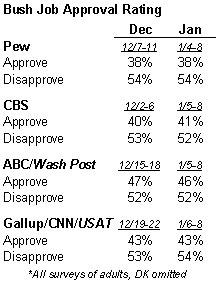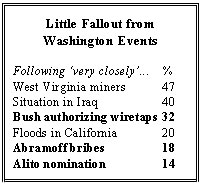Tonight we have another national survey to consider, this one released earlier today by the Pew Research Center (report, topline questionnaire , crosstab tables, complete PDF). While the Pew report, as usual, covers a wide variety of topics and is worth reading in full, MP wants to point out two findings. First, picking up where we left off yesterday, we have a fourth survey this week showing no change in the Bush job rating since early December. Second, the questions on the Alito nomination provide poll consumers with an important caution about how easily Americans will offer an opinion even when not well informed.
First, the Pew survey shows the Bush job rating totally unchanged at 38% approve, 54% disapprove since their last survey in early December. Thus, as the table below shows, we now have four surveys out this week. The four surveys show – at most — changes of only a single percentage point, no where near statistical significance in any direction. In terms of the percentage registering approval, one shows Bush a point higher, one a point lower and two show no change at all. From MP’s perspective, that adds up to no meaningful change in the last month on Bush job approval.

One of the most valuable aspects of the Pew Research Center surveys is the way they regularly and methodically track the attention Americans are paying to the various news stories of the moment. By measuring this interest in exactly the same way on every survey, they allow us to compare the impact of any given story to over a thousand other issues tracked over the last twenty years. These comparisons often provide a reality check and this latest survey is no exception.
Consider the results from the current report (in the table reproduced below). Nearly half of Americans (47%) say they have been “very closely” following news on “the death of twelve miners in a West Virginia coal mine,” while only 18% have been similarly attentive to “Washington lobbyist Jack Abramoff admitting he bribed members of Congress” and only 141% to “the nomination of Samuel Alito to the Supreme Court.”

The relative inattention of the public to the Alito nomination helps why the four polls show huge variation in the percentage who are able to offer an opinion on whether should be confirmed. The percentage who could not offer an opinion varies from 74% on the CBS poll (that offered “can’t you say” as an option) to 20% and 21% respectively on the Gallup and ABC/Washington Post polls. Obviously, more than half of the American public will offer an opinion on the Alito nomination when pushed who have not been following the issue closely and would offer no opinion of given the option.
- CBS – What do you think right now? Should the Senate vote to confirm Samuel Alito as a Justice of the U.S. Supreme Court, or vote against Alito, or can’t you say? — 17% vote to confirm, 9% vote against, 70% can’t say, 4% no answer
- Pew – From what you’ve seen and heard so far, do you think the Senate should or should not confirm Samuel Alito to the Supreme Court?
— 33% should, 19% should not, 48% don’t know - Gallup/CNN/USAToday – As you may know, Samuel Alito is the federal judge nominated to serve on the Supreme Court. Would you like to see the Senate vote in favor of Alito serving on the Supreme Court, or not?
— 49% yes-vote in favor, 30% no-not, 21% no-opinion - ABC/Washington Post – On another subject, as you may know, Bush has nominated federal judge Samuel A. Alito to serve on the U.S. Supreme Court. Do you think the U.S. Senate should or should not confirm Alito’s nomination to the Supreme Court?
— 53% should confirm, 27% should not, 20% no opinion
In this case, the ration of support to opposition is roughly the same regardless of the attention paid. Both the CBS and ABC/Washington Post poll show roughly two-to-one support for his nomination. The Pew survey takes this a step further by comparing attitudes among those following the Alito nomination very or fairly closely to those not following it. Again, the ratio of supporters to opponents is similar among both the attentive (52% to 29% or 1.8) and inattentive (22% to 14% or 1.6). Not surprisingly the inattentive were much less likely to offer an opinion (64%) than those paying attention (19%).

However, this example should serve as a caution to poll consumers everywhere. Americans will often offer opinions when pushed, even when they are not paying attention to the issue at hand.